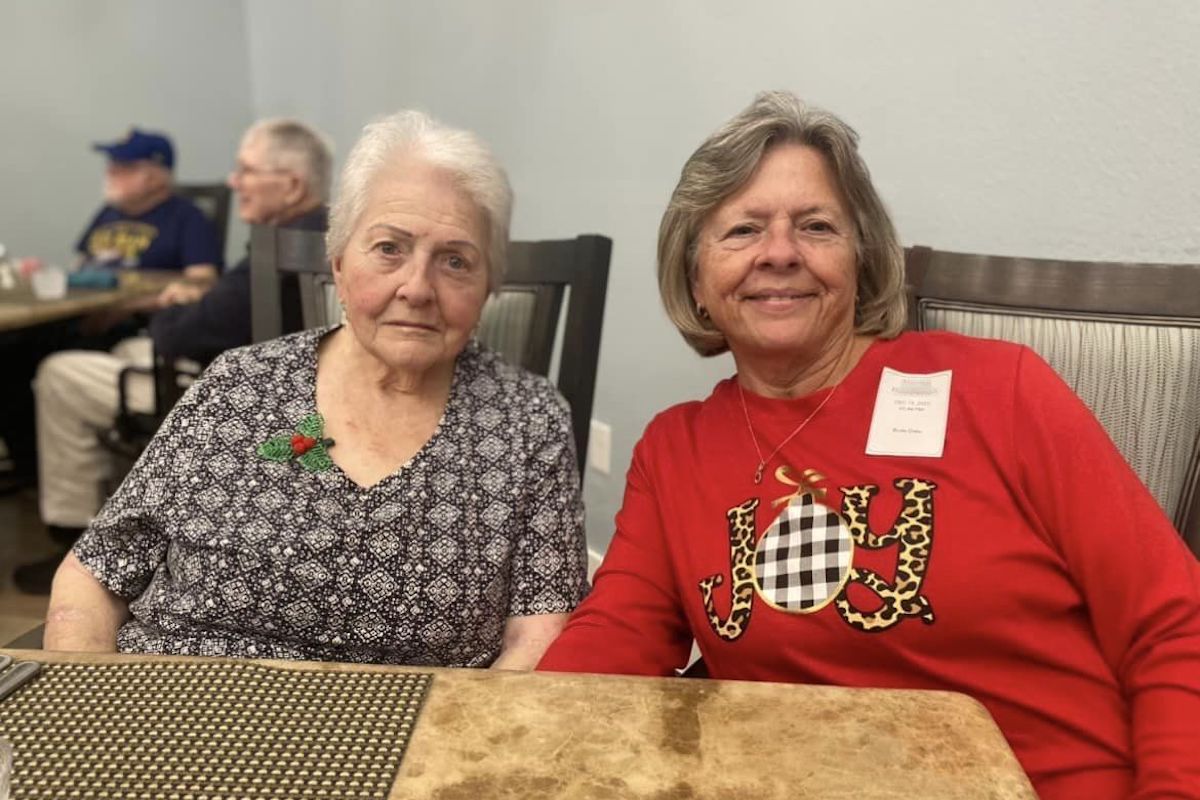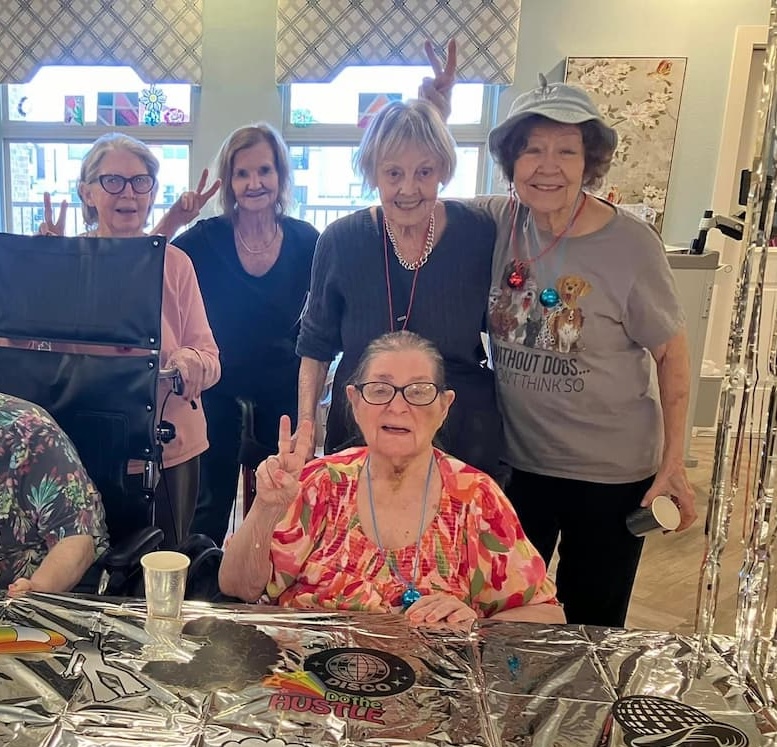Many adult children are afraid to discuss moving to senior living communities with their parents. At Buda Oaks, we understand how that feels. There’s a fine line between respecting a parent’s independence and acknowledging the need for additional support.

Bringing up the subject may create worries about resistance, strong emotions, and a perceived imposition on your parents’ freedom. But the challenge of how to talk to parents about assisted living can be addressed with empathy and positivity.
The Importance of Assisted Living Conversations
Conversations about senior care are often necessary, but adult children may need help knowing what signs to look for. Here are some noticeable red flags we hear from other family members in your situation:
- Mobility challenges: Difficulty moving around, increased instances of falls, or struggles with everyday activities like getting out of bed or walking.
- Forgetfulness and memory loss: Persistent forgetfulness and difficulty remembering names, appointments, or recent events may indicate cognitive decline.
- Decline in personal hygiene: Neglect of personal grooming and hygiene can indicate that your loved one struggles to maintain self-care.
- Changes in eating habits: Significant weight loss, malnutrition, or skipping meals may signal challenges in preparing and consuming food.
- Loneliness and isolation: Withdrawal from social activities, loss of interest in hobbies, and limited interaction with others may indicate loneliness.
- Medication mismanagement: Forgetting doses or taking incorrect medications could pose health care risks.
- Safety concerns at home: Evidence of accidents, like leaving appliances on or doors unlocked, may indicate decreased awareness of personal safety.
- Frequent health issues: A series of health problems or recurring medical issues that are challenging to manage independently.
- Struggles with housekeeping: A decline in the ability to keep the living space clean and organized, leading to potential safety hazards.
It’s easy to see how these situations can negatively impact a loved one’s health, well-being, and safety. When you consistently notice any of these signs, start the conversation proactively.
How can an assisted living community help your parents?
An assisted living community offers numerous benefits for older adults seeking support and companionship in their retirement years. The residents enjoy personalized care plans tailored to their needs, promoting independence and assistance with daily tasks.
These communities provide secure environments, reducing concerns about home maintenance and security. Social opportunities abound, fostering meaningful connections and reducing feelings of isolation. They differ from traditional retirement communities that don’t offer medical and personal support services.
Moreover, amenities like dining services, recreational activities, and transportation further enhance the quality of life. With trained geriatric care managers available to assist and support, residents and families have peace of mind knowing help is always available.
Ultimately, senior living options like these offer vibrant, supportive settings. Older adults can thrive and enjoy their retirement years to the fullest–it’s often a better choice than home care.
Now that we’ve established the benefits of assisted living, we’ll discuss talking to aging parents about assisted living. Here are some tips other families in your situation have used.
How to Talk to Elderly Parents About Assisted Living
These tips for talking to your parent about assisted living can guide you throughout the process:
- Create a secure space for an assisted living conversation. Instead of surprising your loved one, tell them you’d like to have an important discussion and set a date. Plan to have it at their home or yours rather than a public location. You might want to speak with them alone or with family members.
- Decide what you want to talk about in advance; we recommend writing points to cover everything you want to discuss.
- Remember, you may need to have several conversations about senior care with them. Manage your expectations, bearing in mind that it might take them a while to warm up to the idea.
Addressing Concerns and Offering Solutions
It’s natural for seniors to protest the idea of transitioning to assisted living. Often, they are resistant to change or fear the unknown.
Rather than arguing, acknowledge how your parent feels with empathy and understanding. Provide clear, concise information about the benefits of assisted living, emphasizing the additional support and opportunities for social engagement it offers.
Sharing Personal Stories and Successes
When talking about assisted living, share stories of individuals who have thrived in communities to make the conversation relatable and reassuring.
Highlight successes and positive experiences to alleviate apprehensions your parents may have. If you don’t have sharable stories, visit the Buda Oaks Facebook page for photos of residents enjoying community events with family members and caregivers.
Collaborative Decision-Making
Instead of appointing yourself as the sole decision-maker, approach the discussion as a collaborative process.
Involve your parents in the different steps, explaining options and bringing them along on tours. Respect their needs and priorities to ensure their voices are heard. Don’t interrupt or raise your voice, even if they do.
Providing Resources and Information
Use an authoritative, informative tone when talking to parents about senior living. Help them understand why the conversation is important, but use comprehensive information to back yourself up.
Equip yourself with relevant details about the available assisted living options, including amenities, healthcare services, and social programs. Share this information in a structured manner, avoiding complex words that might confuse or overwhelm them.
What if they cannot understand me?
Helping confused older adults understand your words requires patience, clarity, and empathy. As we age, cognitive abilities may decline, making it challenging to process information quickly or accurately. Communication must be tailored to their needs to bridge this gap effectively.
Start discussing assisted living by speaking slowly and clearly, using simple language. Break down information into smaller, digestible chunks, allowing ample time for them to absorb each point before moving on. Use visual aids, such as charts or diagrams, to supplement verbal explanations and enhance comprehension.
Active listening also plays an essential role in ensuring understanding. Encourage questions and provide reassurance, creating a safe environment where they feel comfortable seeking answers. Use repetition when necessary, reinforcing key points to aid retention.
Empathy is key; acknowledge their frustrations and validate their concerns. Maintain eye contact and offer gentle encouragement to promote trust and cooperation. Avoid condescension or impatience, as they can increase confusion and undermine communication efforts.
Above all, approach interactions with kindness and respect and adapt your words to meet their needs. By demonstrating genuine care, you can help loved ones overcome some of the confusion.
Concluding the Conversation with Reassurance
As each discussion ends, emphasize your commitment to supporting your parents in this transition. Offer reassurance that the decision is based on their well-being and the desire to enhance their overall quality of life. End the assisted living conversation on a positive note, expressing confidence in the positive outcomes of assisted living.
We encourage you to begin that conversation about a fulfilling and worthwhile journey for Mom or Dad. We commend your courage and lend you our utmost support! At the end of the day, you are doing what’s best for your family.
Moving to assisted living is easier when it starts with open communications. Please let our team know if you would like assistance beyond this article; we are happy to help and meet in person.
We Can Help Get Your Loved Ones on the Same Page with Assisted Living
The Buda Oaks team understands how to talk to parents about assisted living and can help you navigate the hard conversations. Contact us for a personalized tour and helpful advice. We look forward to meeting you and your family.

